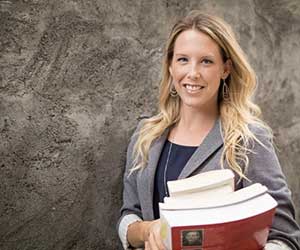
Kara Ball, an MS in Education graduate and 2018 National Teacher of the Year finalist, has always been interested in science. Her father cultivated her curiosity at a young age by encouraging her to never stop asking why, and that’s something that has stayed with her well into her teaching career.
“I want my students to wonder about the world around them and to think about the possibilities they could have to make an impact on it,” says Ball, who teaches a fourth- and fifth-grade classroom and science, technology, engineering, and math (STEM) at DeLalio Elementary School in Camp Lejeune, North Carolina, a Department of Defense Education Activity school. “I want them to want to leave the world a better place than they found it, and they can only do that if they’re curious and take risks.”
While growing up in Maryland, Ball and her father would build model rockets during the summer, so it’s no wonder she’s doing the same with her fourth-grade students as part of a force-in-motion unit. “I also want students to see the possibilities of different careers and how they authentically relate to content at school. STEM education parlays into that nicely by giving them challenges and the opportunity to learn resiliency, resourcefulness, collaboration, and how to think critically about the world around them.”
Ball is serious about challenging her students. “My dad used to challenge me all the time when I was little,” she recalls. “For example, I used to not want to go into the ocean because I was afraid of sharks, but his strategy was to educate in order to eradicate the fear.”
Now a self-confessed shark enthusiast who never misses Discovery Channel’s Shark Week, Ball discovered that her students, who live in a coastal community, had similar fears about sharks. “After a particularly gruesome summer of shark attacks, many students returned to school talking about it, and so we decided to really focus on the facts and statistics and how it’s not just about attacks on humans but also humans’ impact on sharks.”
Ball partnered with a local ecological society that donated five shark samples for second-graders to dissect. “Because they’re too young to use a scalpel, we also work with our local military unit who volunteer to help with the dissection. The students, however, do use probes, tweezers, gloves, masks, and all the correct terminology to look for injuries and collect data as they open up the shark to look for skeletons and to find out how many pups are inside.”
Ball’s goal is to expose her students to as many possibilities as she can before the school year ends, and sometimes her students help her see things differently as well. “During one of our 3-D printing activities, I challenged the students to print an animal as close to its true color as they could,” she recalls. “One student picked a sloth and wanted to print him in green, not a tan or brown color. I asked her to find some information on green sloths and bring it in to me so we could review it together. The student returned to school with a paper she wrote based on research she found that there are in fact some sloths that move so slowly that sometimes they grow algae on their fur and thus appear green. I love that she felt comfortable and curious enough about the world to ask questions and challenge the narrative. School should be a safe place to have that conversation.”
One guiding principle Ball follows and hopes other teachers embrace is to not be afraid to take risks. “Making mistakes is a natural process of learning, and if we model what it looks like to be a learner and how to persevere through challenges, our students and children will, too,” she says. “It’s a privilege to be able to teach military-connected kids who often feel like they’re invisible, but they’re so resilient and the best bunch of students a teacher could hope to have during his or her career.”
Ball is one of four finalists for 2018 National Teacher of the Year. Each year, since 1952, the president of the United States has recognized the National Teacher of the Year in a White House ceremony in the spring.
—Jen Raider



